| Listing 1 - 10 of 26 | << page >> |
Sort by
|
Book
ISBN: 9780664220983 0664220983 Year: 2008 Publisher: Louisville Westminster/John Knox Press
Abstract | Keywords | Export | Availability | Bookmark
 Loading...
Loading...Choose an application
- Reference Manager
- EndNote
- RefWorks (Direct export to RefWorks)
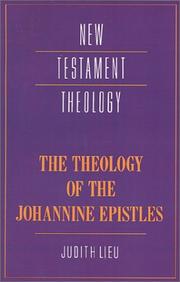
ISBN: 0521352460 052135806X 1316039331 051162137X 9780521358064 9780521352468 Year: 1991 Publisher: Cambridge Cambridge University press
Abstract | Keywords | Export | Availability | Bookmark
 Loading...
Loading...Choose an application
- Reference Manager
- EndNote
- RefWorks (Direct export to RefWorks)
The Johannine Epistles have long been recognised as contributing a vital element to the theology of the New Testament. Usually it is to the Gospel that the reader turns first in order to explore that contribution; the First Epistle is treated as a supplement, while 2 and 3 John - on account of their brevity - receive little attention. This book allows the Epistles to speak for themselves, and shows that they sound a distinctive note within Johannine theology, in particular, and the thought of the New Testament, in general. Dr Lieu carefully outlines their most important theological themes (comprising, for example, tensions-in-unity between confidence and imperative, individual and community, and faith and tradition) which - when understood in their original setting - are seen to have rich potential for the continuing theology of the Church. By focusing on the Johannine Epistles in their proper context and in their own right, the author of this book thus provides a timely reassessment of the substantial theological contribution they have to make.
Bible. --- Bible --- Theology. --- Criticism, interpretation, etc --- 227*23 --- 227.08 --- #GGSB: Exegese N.T. --- #GGSB: Johannes --- #GGSB: Katholieke brieven --- Brieven van Johannes --- Paulinische theologie --- 227.08 Paulinische theologie --- 227*23 Brieven van Johannes --- #GGSB: Exegese N.T --- Epistles of John (Books of the New Testament) --- Johannine Epistles --- John, Epistles of --- Letters of John (Books of the New Testament) --- Criticism, interpretation, etc. --- Exegese N.T --- Johannes --- Katholieke brieven --- Arts and Humanities --- Religion
Book
ISBN: 9781107029040 110702904X 9781139245876 1316245500 1316254976 1316236056 1316249298 1316251187 1316253074 1316247392 1139245872 1316234169 1108434045 9781316247396 9781316234167 Year: 2015 Publisher: New York Cambridge University Press
Abstract | Keywords | Export | Availability | Bookmark
 Loading...
Loading...Choose an application
- Reference Manager
- EndNote
- RefWorks (Direct export to RefWorks)
A comprehensive and authoritative account of the 'heretic' Marcion, this volume traces the development of the concept and language of heresy in the setting of an exploration of second-century Christian intellectual debate. Judith M. Lieu analyses accounts of Marcion by the major early Christian polemicists who shaped the idea of heresy, including Justin Martyr, Irenaeus, Tertullian, Epiphanius of Salamis, Clement of Alexandria, Origen, and Ephraem Syrus. She examines Marcion's 'Gospel', 'Apostolikon', and 'Antitheses' in detail and compares his principles with those of contemporary Christian and non-Christian thinkers, covering a wide range of controversial issues: the nature of God, the relation of the divine to creation, the person of Jesus, the interpretation of Scripture, the nature of salvation, and the appropriate lifestyle of adherents. In this innovative study, Marcion emerges as a distinctive, creative figure who addressed widespread concerns within second-century Christian diversity.
Church history --- Theology, Doctrinal --- History --- Marcion, --- Markion, --- מרקיון --- 276 =75 MARCION --- 276 =75 MARCION Griekse patrologie--MARCION --- 276 =75 MARCION Patrologie grecque--MARCION --- Griekse patrologie--MARCION --- Patrologie grecque--MARCION --- Theology, Doctrinal. --- Christian doctrines --- Christianity --- Doctrinal theology --- Doctrines, Christian --- Dogmatic theology --- Fundamental theology --- Systematic theology --- Theology, Dogmatic --- Theology, Systematic --- Theology --- Apostolic Church --- Church, Apostolic --- Early Christianity --- Early church --- Primitive and early church --- Primitive Christianity --- Fathers of the church --- Great Apostasy (Mormon doctrine) --- Doctrines --- Church history - Primitive and early church, ca. 30-600 --- Theology, Doctrinal - History - Early church, ca. 30-600 --- Marcion, - of Sinope, - active 2nd century
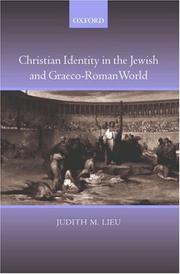
ISBN: 019929142X 9780199291427 0199262896 9780199262892 0199262896 9786611198718 0191532347 1281198714 1429420219 0191602817 Year: 2004 Publisher: Oxford Oxford university press
Abstract | Keywords | Export | Availability | Bookmark
 Loading...
Loading...Choose an application
- Reference Manager
- EndNote
- RefWorks (Direct export to RefWorks)
'I am a Christian' is the confession of the martyrs of early Christian texts and, no doubt, of many others; but what did this confession mean, and how was early Christian identity constructed? This innovative study sets the emergence of Christian identity in the first two centuries, as it is constructed by the broad range of surviving literature, within the wider context of Jewish and Graeco-Roman identity. It uses a number of models from contemporary constructionist views of identity formation to explore how what comes to be seen as 'Christian' literature creates a sense of what to be 'a Christian' means, and traces both continuities and discontinuities with the ways in which Jewish and Graeco-Roman identity were also being constructed through their texts. It seeks to acknowledge the centrality of texts in shaping early Christianity, historically as well as in our perception of it, while also exploring how we might move from those texts to the individuals and communities who preserved them. Such an approach challenges more traditional emphases on the development of institutions, whether structures or credal and ethical formulations, which often fail to recognize the rhetorical function of the texts on which they draw, and the uncertainties of how well these reflect the actual practice and experience of individuals and communities. While building on recent recognition of the diversity of early Christianity, the book goes on to explore the question whether it is possible to speak of a distinctive Christian identity across both the range of early texts and as a pressing historical and theological question in the contemporary world.
Church history --- Identity (Psychology) --- Religious aspects --- Christianity. --- 27 "00/04" --- Kerkgeschiedenis--?"00/04" --- Personal identity --- Personality --- Self --- Ego (Psychology) --- Individuality --- Apostolic Church --- Christianity --- Church, Apostolic --- Early Christianity --- Early church --- Primitive and early church --- Primitive Christianity --- Fathers of the church --- Great Apostasy (Mormon doctrine) --- Religious aspects&delete& --- Christianity and other religions --- Eglise --- Identité (Psychologie) --- Christianisme --- Psychology --- Histoire --- Aspect religieux --- Psychologie --- Relations --- Primitive and early church, ca. 30-600 A.D. --- Church history - Primitive and early church, ca. 30-600 --- Identity (Psychology) - Religious aspects - Christianity
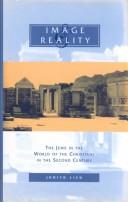
ISBN: 0567085295 0567089630 9780567085290 9780567089632 Year: 1996 Publisher: Edinburgh Clark
Abstract | Keywords | Export | Availability | Bookmark
 Loading...
Loading...Choose an application
- Reference Manager
- EndNote
- RefWorks (Direct export to RefWorks)
296 "00/04" --- Christianity and other religions --- -Church history --- -Jews --- -Judaism --- Religions --- Semites --- Jews --- Hebrews --- Israelites --- Jewish people --- Jewry --- Judaic people --- Judaists --- Ethnology --- Religious adherents --- Judaism --- Christianity --- Ecclesiastical history --- History, Church --- History, Ecclesiastical --- History --- Syncretism (Christianity) --- Judaïsme. Jodendom--?"00/04" --- -History --- -Relations --- -Christianity --- Religion --- Relations --- Church history --- Christianity. --- Judaism. --- Judaism - Relations - Christianity. --- Christianity and other religions - Judaism. --- Judaism - History - Talmudic period, 10-425. --- Jews - History - 70-638. --- Church history - Primitive and early church, ca. 30-600.
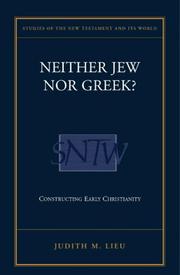
ISBN: 0567665437 0567658821 9780567665430 9780567658821 9780567089090 9780567658814 0567658813 0567089096 Year: 2016 Publisher: London Bloomsbury T & T Clark
Abstract | Keywords | Export | Availability | Bookmark
 Loading...
Loading...Choose an application
- Reference Manager
- EndNote
- RefWorks (Direct export to RefWorks)
"A ground-breaking study in the formation of early Christian identity, by one of the world's leading scholars. In Neither Jew Nor Greek, Judith Lieu explores the formation and shaping of early Christian identity within Judaism and within the wider Graeco-Roman world in the period before 200 C.E. Lieu particularly examines the way that literary texts presented early Christianity. She combines this with interdisciplinary historical investigation and interaction with scholarship on Judaism in late Antiquity and on the Graeco-Roman world.The result is a highly significant contribution to four of the key questions in current New Testament scholarship: how did early Christian identity come to be formed? How should we best describe and understand the processes by which the Christian movement became separate from its Jewish origins? Was there anything special or different about the way women entered Judaism and early Christianity? How did martyrdom contribute to the construction of early Christian identity? The chapters in this volume have become classics in the study of the New Testament and for this Cornerstones edition Lieu provides a new introduction placing them within the academic debate as it is now."--Bloomsbury Publishing A ground-breaking study in the formation of early Christian identity, by one of the world's leading scholars.In Neither Jew Nor Greek, Judith Lieu explores the formation and shaping of early Christian identity within Judaism and within the wider Graeco-Roman world in the period before 200 C.E. Lieu particularly examines the way that literary texts presented early Christianity. She combines this with interdisciplinary historical investigation and interaction with scholarship on Judaism in late Antiquity and on the Graeco-Roman world.The result is a highly significant contribution to four of the key questions in current New Testament scholarship: how did early Christian identity come to be formed? How should we best describe and understand the processes by which the Christian movement became separate from its Jewish origins? Was there anything special or different about the way women entered Judaism and early Christianity? How did martyrdom contribute to the construction of early Christian identity? The chapters in this volume have become classics in the study of the New Testament and for this Cornerstones edition Lieu provides a new introduction placing them within the academic debate as it is now
Church history --- Apostolic Church --- Christianity --- Church, Apostolic --- Early Christianity --- Early church --- Primitive and early church --- Primitive Christianity --- Fathers of the church --- Great Apostasy (Mormon doctrine) --- 281.2 --- 281.2 Apostolische Kerk. Judeo-christianisme:--tot einde 1ste eeuw --- Apostolische Kerk. Judeo-christianisme:--tot einde 1ste eeuw
Book
ISBN: 9789042946897 9789042946903 904294689X 9042946903 Year: 2021 Publisher: Leuven Peeters
Abstract | Keywords | Export | Availability | Bookmark
 Loading...
Loading...Choose an application
- Reference Manager
- EndNote
- RefWorks (Direct export to RefWorks)
"Comprising the papers read at the 68th meeting of the Colloquium Biblicum Lovaniense, which was held in 2019, Peter in the Early Church: Apostle - Missionary - Church Leader reflects the abundance and striking variety of literary and non-literary early Christian traditions about Peter. Such variety has in the past led researchers to describe the figure of Peter as malleable. By adopting a wide range of scholarly ways of reading texts or posing questions, as is now characteristic of New Testament studies, the papers in this volume reflect and develop further recent challenges to the classic binaries of canonical vs. non-canonical, orthodox vs. heterodox or heretical, elite vs. popular, core vs. marginal, and 'pure' vs. syncretistic. Thus in addition to demonstrating the productivity of plotting the various embodiments of Peter and their manifold interrelationships, this volume opens up new vistas and raises new questions about this most central yet enigmatic figure of early Christian memory."
Christian church history --- Peter [Apostle] --- Church history --- 225-05 --- 225-05 Personen in het Nieuwe Testament. Apostelen --- Personen in het Nieuwe Testament. Apostelen --- Petrus --- Peter --- Pierre --- Cephas, --- Pedro, --- Pietro, --- Simon Bar Jona, --- Simon Peter, --- Simon Petrus, --- Simon Petrus
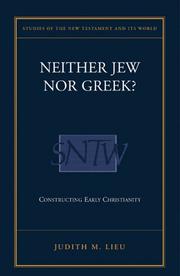
ISBN: 0567083268 Year: 2005 Publisher: London Clark
Abstract | Keywords | Export | Availability | Bookmark
 Loading...
Loading...Choose an application
- Reference Manager
- EndNote
- RefWorks (Direct export to RefWorks)
Christian church history --- Bible NT --- anno 1-99 --- anno 100-199
Book
Year: 2017 Publisher: Cambridge Cambridge University Press
Abstract | Keywords | Export | Availability | Bookmark
 Loading...
Loading...Choose an application
- Reference Manager
- EndNote
- RefWorks (Direct export to RefWorks)
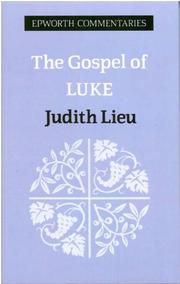
ISBN: 0716205165 Year: 1997 Publisher: London Epworth
Abstract | Keywords | Export | Availability | Bookmark
 Loading...
Loading...Choose an application
- Reference Manager
- EndNote
- RefWorks (Direct export to RefWorks)
| Listing 1 - 10 of 26 | << page >> |
Sort by
|

 Search
Search Feedback
Feedback About UniCat
About UniCat  Help
Help News
News